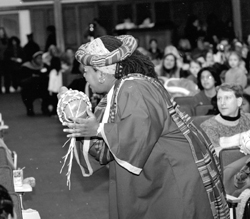The University Record, January 24, 2000 By Amy Reyes
News and Information Services

“Oh, freedom, Oh, freedom
“Oh, freedom over me”
In a voice that carried like a melody of a songbird, Tiana Marquez, a performance artist from Ann Arbor, gave a presentation during a Jan. 17 Martin Luther King Jr. Day celebration sponsored by the schools of Education and Social Work and the MLK Symposium Planning Committee.
The child-oriented program drew approximately 400 attendees who filled Lorch Hall’s Askwith Auditorium. The program also featured Latino song and dance, a performance by the Detroit-based Mosaic Youth Choir, folk singing, and arts and crafts workshops.
Marquez told a story of a 5-year-old girl who attended the “Children’s Crusade,” a civil rights rally for children that took place in Montgomery, Ala., in 1963. The story, told as if it were a personal account, also was about a little girl’s understanding of the Civil Rights Movement. Marquez’s story was lined with spiritual songs that resonated with grief and longing for freedom.
As the child understood the Civil Rights Movement, it was so that she could attend the school nearest her home instead of having to attend one far from home. It was about being allowed to use the same public restrooms whites used. Her parents told her the march was about freedom for the children she would have one day and for every generation thereafter. It was about making history, Marquez told the audience.
But as the child stood next to her grandmother at what was to be a peaceful civil rights rally, policemen and firefighters plastered them with spray from a fire hose.
“We shall overcome . . . ” Marquez sang. “I remember the policemen and firemen who came with the water hose. I was so scared. I was crying for my grandma. Finally, they turned the water hose off and I felt my grandma holding me. She was singing like she always does . . . ain’t gonna let nothing turn me around, turn me around . . . ’’ The observance of the birth of Martin Luther King Jr. is not only about recounting King’s work, Marquez said, it also is about remembering all the battles in between, such as that of Rosa Parks, a Detroit woman who refused to give up her seat on a bus in Montgomery, Ala., Marquez said.
“Oh, freedom. Oh, freedom. Oh, freedom.
Oh, freedom.”
“I remember the kinds of things I couldn’t do because I was colored. I remember my mamma and daddy trying to explain what segregation meant,” she told the audience.
This is the second year the two schools have organized a children’s program for MLK observance, said Ron Avi Astor, assistant professor of social work and of education, and a member of the Schools’ MLK Planning Committee.
“We felt very strongly there should be some type of child-orientated event that focused on how children learn about Martin Luther King Jr., and what that means for the community,” he said.
This year’s program was attended by approximately twice as many children and parents as last year. Ideally, Astor said, the committee would like to expand the program to involve more of the community and move it to a larger venue.

